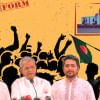French Revolution and our mass uprising

Every people's revolution has stories of individual commitment, collective courage, gallantry of the leaders, common people's suffering and personal tragedies. Though revolutions create many heroes, these are not the best of times in the lives of the people who get caught in the vortex of an upheaval. These are the times of deaths and destruction; these are the times of great sacrifices by a nation for achieving something bigger than life – freedom.
The stories of revolutions become components of novels, of poems and of ballads and they live on for centuries to inspire another revolution, some day, somewhere. French Revolution, if we may take as an example, had greatly inspired Bengalis before and during the uprising of the students and the people in the late '60s and early '70s which had successfully culminated into the War of Liberation and creation of Bangladesh in 1971.
If we may take a quick look at the situations leading to the French Revolution we would be amazed at the similarities of things happening in this part of the world in the '60s. The autocratic ruler of France, King Luis XVI, was failing to run the country properly, which caused poverty throughout France to go up alarmingly. He also failed to win some crucial battles against enemies, especially against the British, in his bid to extend colonies overseas. The final blow came when France was driven out of India by the British forces. Already the coffer was drained out in overseas expeditions, but the king took no measures to boost agricultural and industrial output and as a result, the economy of France started to dip dangerously. With non-stop looting and hoarding of food and other essentials by the King's henchmen, suffering of the people mounted every day.
Despite the deplorable economic conditions, the royalty of France continued with their life of picnicking abroad, throwing lavish state dinners and arranging ball dances in numerous palaces in Paris and other cities. The noble lords and army generals remained the main beneficiaries of whatever the people could offer them as taxes. It is no wonder therefore that in the dimly-lit taverns and alleyways of Paris semi-starved people talked about a revolution to remove the tyrant king. They waited for a leader.
Meanwhile persecution of the common people, writers, philosophers and small leaders continued. The loyal soldiers of the king arrested men and women on charges of conspiracy and put them under the killing machine named 'Guillotine." Others were thrown into the infamous fort-prison called 'Bastille'.
The people of Paris looked up at the towering Bastille prison as the symbol of tyranny and vowed to storm it one day to release their comrades. As they grew in number every day, they became more and more ambitious. They also drew inspiration from the works of Voltaire and other philosopher writers who denounced the depravity and debauchery of the monarchy and corruption of the Churches. Finally Parisians found a leader in Marquis de Lafayette. Lafayette was a 'French military officer who fought for the United States in the American Revolution. He became a key figure in the French Revolution.
Encouraged by the swelling number of people ready to fight and the military acumen of Lafayette, Parisians attacked Bastille with all they had on 14 July, 1789. The symbol of royal power fell at the feet of the common people of Paris. The days of Luis XVI were numbered. Since then, this day is observed by France as their National Day.
The story of the fall of Bastille, spearheaded by the common people of Paris, was in the minds of the Bengali people and students who looked at Dhaka Cantonment as the bastion of evil power in their midst. It is there that the popular leader of the people, Bangabandhu Sheikh Mujibur Rahman, was kept in confinement by the Pakistani rulers on charges of conspiring against Pakistan, which came to be known as "Agartala Conspiracy Case."
The Bengali people in general rejected the charges and began non-stop street rallies, demonstrations and blockades defying Section 144. The police opened fire in many places killing demonstrators by the dozens. But, the people of Dhaka did not fear the bullets of Ayub Khan, because they knew the history of the sacrifice of the Parisians in 1789.
And like Bastille, Dhaka Cantonment literally fell on 22 February, 1969 when thousands of people, students, lawyers, professionals and progressive political leaders marched towards Dhaka Cantonment to force the authorities to release Bangabandhu from the prison there. When the front section of the marchers had reached the third gate near Shaheen School, the tail was still at Shahbagh.
As storming of Bastille had heralded the fall of Luis XVI, the fall of Dhaka Cantonment on 22 February and release of Sheikh Mujibur Rahman had literally paved the way for the end of Pakistan in the soil of Bengal.
The socio-political and economic situation of the then East Pakistan in the 1960s and that of France in the 1780s was almost same as both the peoples were victims of ceaseless exploitation by the ruling class in cahoots with corrupt army generals. In both the cases, common people, the working class, were low paid and had little means of survival. There was unabashed display of wealth by the privileged class when people suffered in rain, cold and drought in both the countries.
As there was no sign of improvement of the situation, and no attempt made by the rulers to empathize and take some positive measures to end the ordeal, the only option left to the people was taking up arms against the oppressive rulers. The people of Paris did that and so did the people of Dhaka for their emancipation.
Like the people in any revolution in history, Bengalis suffered immensely in their fight for freedom but ultimately came out victorious. And that is the reward one gets at the end of a revolution.
The writer is Special Supplements Editor, The Daily Star.

 For all latest news, follow The Daily Star's Google News channel.
For all latest news, follow The Daily Star's Google News channel. 








Comments